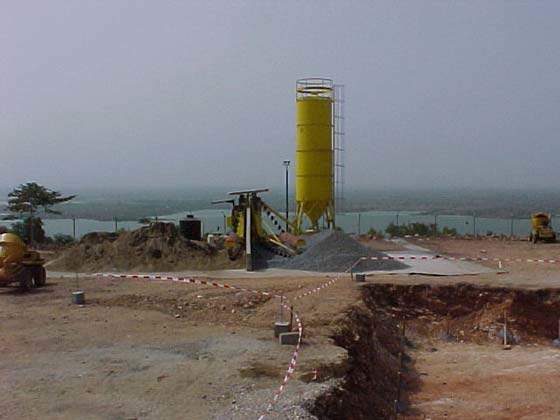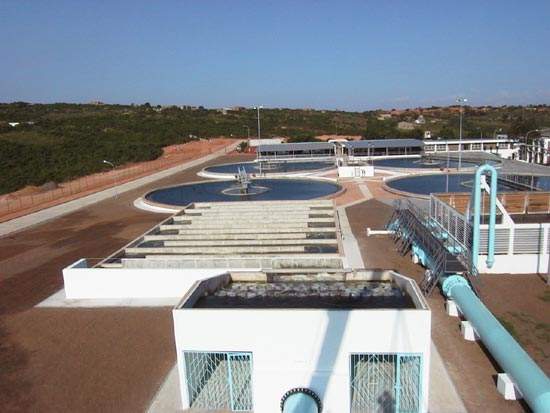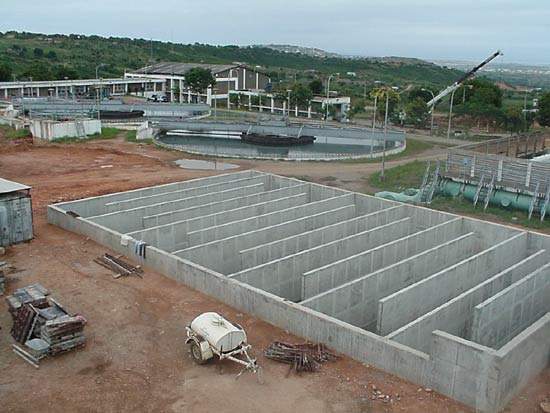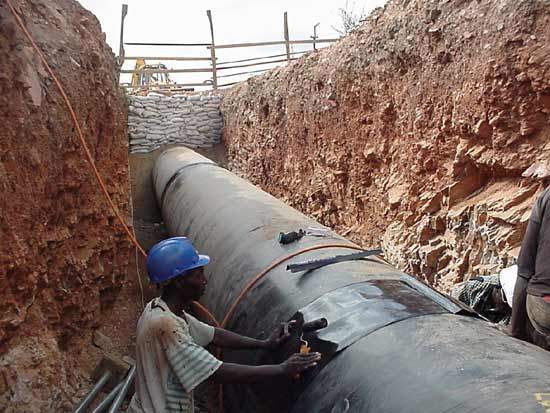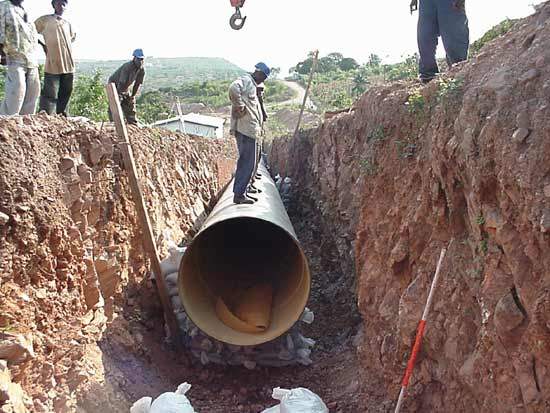The Government of Ghana through the Ghana Water Company is currently implementing a programme of economic and structural reform with the support of the IMF and the World Bank. This has seen Ghana undertake the planning of regional and urban water supply schemes for Cape Coast, Tarkwa, Winneba, Sekondi-Takoradi, Ekumfi and Koforidua, and the preparation of contract documents and drawings for Sekondi-Takoradi and district water supply schemes. Amid public unpopularity, the government is planning to lease the Accra-Tema water service to two foreign multi-nationals.
The Ghana Water Company has designed and supervised the construction of the 165,000m³/day Weija water treatment plant within stage II of the Accra-Tema Water Supply and Sewerage Project. The plant is used for the treatment of surface water and produces potable water. The water company was also involved in the overall design and supervision of construction for the second stage of the Accra-Tema metropolitan area water supply scheme, inclusive of the New Weija Dam. This included the planning, design and supervision of the construction of water supply schemes for 90 rural communities in the Accra-Tema region.
In 1998 Ballast Nedam International signed a contract for the Rehabilitation and Expansion of the Adam Clark Water Treatment Plant at Weija and the Distribution Improvement of the Western Accra Area. The commencement of the project was, amongst other criteria, subject to Ballast arranging the financing of the project in such a way that it conformed with the conditions set down by the IMF and Worldbank. The financing of the project eventually took the form of a 35% grant provided by the Government of the Netherlands and a 65% commercial loan. The project was started in September 1999 and was completed within the scheduled 2 year period and the contract sum of approximately $22 million. The project was opened in October 2001 by the President of Ghana.
FACILITIES UPGRADE
The technical features of the contract incorporated the design, engineering, procurement and construction work for the upgrade of the Adam Clark Treatment Plant to achieve its rated production of 63,000m³/day by refurbishment of existing component facilities and equipment. The production at the plant was expanded by a further 63,000mm³/day by construction of additional facilities and buildings and the installation of new equipment.
The refurbishment involved the renovation of the two existing clarifiers, the filtration plant and the treated water storage tank. In the two clarifiers the static bridge was replaced by a rotating one, a new inlet pipe and middle cone were placed and the top of the clarifier wall was widened so as to accommodate the rotating bridge. The rehabilitation of the filtration plant involved the construction of new floor slabs including filter nozzles, reinforcement of the dividing walls between the filters, coating of the filter walls, construction of sunroofs over the filters and the replacement of various mechanical and electrical equipment.
The expansion of the plant involved the construction of a cascade and contact tank, two clarifiers, a filtration plant, a treated water storage tank, a PAC (powdered activated carbon) building and the supply and installation of various dosing equipment.
RAW WATER PUMPS AND TRANSMISSION
The contract also required the improvement of the Raw Water transmission and the upgrading of the existing Raw Water Pumping Station through the installation of two new 2250m3/hr high lift pumps. The improvement of the raw water transmission was facilitated through the installation of a 1.5km raw water pipeline (diameter 1100 – 1400mm) between the pumping station and the treatment plant.
In addition, approximately 12km of smaller diameter ductile iron pipes of various sizes were constructed at various locations in Western Accra.
The project has been part of the Government’s rural water supply and environmental health project. This is a combination of long-term programmes for rural water supply for six of Ghana’s nine regions that also includes design of water supply systems for communities, the preparation of a standard design manual for rural water supply systems and the implementation of 3,000 well drilling programmes.
In addition to the World Bank, key bilateral donors in Ghana include Canada, Denmark, France, Germany, Japan, the Netherlands, the U.K., and the U.S.A. Multilateral donors include the African Development Band, EU, FAO/IFAD, UNDP, UNICEF and WHO.
Further water projects associated to the Accra-Tema Water Supply and Sewerage Project, include:
- The second stage of the Accra-Tema metropolitan area water supply scheme (inclusive of New Weija Dam) has been designed and constructed
- Water supply schemes for 90 rural communities in the Accra-Tema region have been planned and constructed
- The water sector rehabilitation project managing the engineering, economic and financial aspects of the project preparation, design and supervision has been supplied by consultants providing on-the-job training
- The Kpong-Tema-Accra 32-42inch diameter pipeline is being surveyed for immediate remedial measures and long-term rehabilitation
- There is a current survey on the Accra water supply network leakage figures, and what can be done to improve them
- The establishment of the Pipeline Maintenance Unit (PMU)

